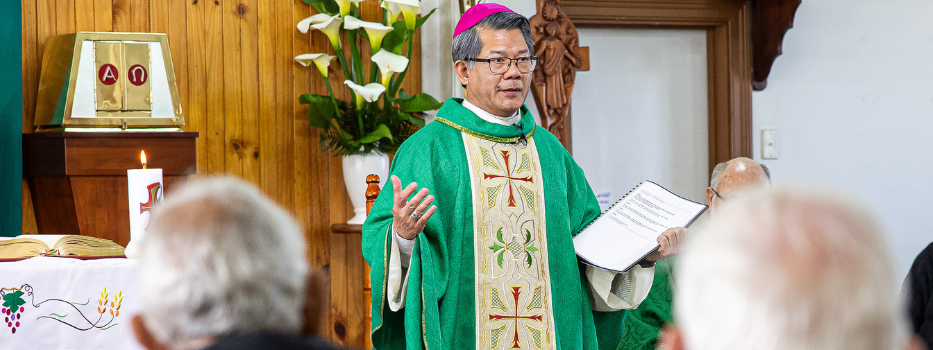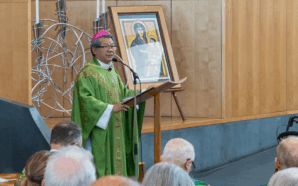Most Reverend Vincent Long Van Nguyen OFM Conv DD STL, Bishop of Parramatta
Homily for the 25th Sunday in Ordinary Time, Year B
Readings: Wisdom 2:12-20; James 3:16-4:3; Mark 9:30-37
22 September 2024
Changing the trajectory of the planet in crisis by the way of Jesus.
Dear friends,
We live in a country that has long prided itself as being the land of opportunity and freedom. The Australian Dream myth is that if we work hard enough, we can achieve economic success; we can own our own home and climb the social ladder. Yet the reality is that increasingly, the ladder of opportunity has become much harder to climb. The rungs of the ladder have grown further apart. This is evidenced by the rising levels of income and wealth inequality.
In these times of high cost of living pressures, many of the people on Struggle Street find themselves in precarious situations. Surely, as people of the Good News, we cannot be complicit in perpetuating the social architecture that favours the privileged, disenfranchises the dispossessed, hollows out the care economy and undermines the foundations of an egalitarian society.
The Word of God today challenges us to live in a way that is different to the way everyone else is culturally conditioned to live. It is about choosing not so much upward mobility as the road less travelled; it is about the courage to create a community of hope, justice and long-term sustainability as opposed to a self-centred, profit-driven and trickled-down modus operandi.
The first reading gives us a reflection on how to live with integrity and righteousness in the midst of adversity. The true believer or the virtuous man does not live by the conventional wisdom that sees success and power as the ultimate proof of a life of faith. In spite of opposition, he entrusts himself to God. He endures unjust judgement and condemnation for the sake of justice.
This mature reflection on suffering is a deeper strand within Bible. In fact, it departs from the usual theology of reward and punishment that we find in many places in the Old Testament. Instead of saying, health and wealth are the rewards of faith, the book of Wisdom takes us to a higher level of spiritual maturity. We are told to pursue integrity and righteousness even when we are cornered without a way out. Powerlessness rather than power, defeat rather than victory, shame rather than honour, poverty rather than prosperity are the ultimate price we pay for a life of authentic faith. After all, this is the way of the Suffering Servant. This reflection is an indictment of the Gospel of prosperity that is still rampant in many churches across all Christian denominations.
The Gospel tells us the story of how Jesus gives his disciples a sobering lesson on authentic discipleship. This is the second time he brings them down to earth after a high adrenaline event. The first time he spoke about his death was after the feeding of the multitudes. Then it was Peter who showed his misunderstanding of discipleship. He was rebuked by Jesus for trying to talk him out of the cross.
This second time, after the Transfiguration, they were all excited about the prospects that lied ahead in Jerusalem. They still did not get it when Jesus spoke to them about his own arrest and crucifixion. They were hopelessly fixated on power. Jesus had to use a child in order to drive home to them a crucial lesson.
“Anyone who welcomes a little child like this in my name welcomes me.” This is a graphic and powerful message about vulnerability and powerlessness.
The way of the empire is all about conquest, subjugation and control. The way of Jesus’ kingdom flies in the face of ambition, upward mobility, power and glory. In effect, he teaches us that Christian discipleship is about the willingness to suffer with others, to be vulnerable with the vulnerable, to be last with the least, to be powerless with those without power.
Dear friends,
The real test of authentic faith lies in our ability to embrace and to live the alternative consciousness of the Gospel or the counter-cultural wisdom of God. If we are on the side of the vulnerable, if we fight for their share of the earth’s resources, if we learn to suffer with them, then we are on the way.
Guided by the kingdom vision of Jesus and open to a world of change, the Church can live up to its prophetic call to be a beacon hope for humanity. We can be an alternative relational paradigm for those on the margins, where the poor and the forgotten can be brought into a new unity; a Church that advocates life at all costs and promotes peaceful life in a war-torn and violent world; a Church that models justice in an age of greed, consumerism, and power; a Church centered on the risen Christ, empowering a consciousness of the whole.
As the people of the Gospel, we commit ourselves to altering the trajectory of the human community and the planet in crisis. In the words of Pope Francis, if we want a different world, we must become a different people. Let us pray that we may prioritise the common good and reflect the divine goodness instead of self-interest. May we reflect the divine pathos and God’s unflinching commitment to the poor revealed in Christ.








